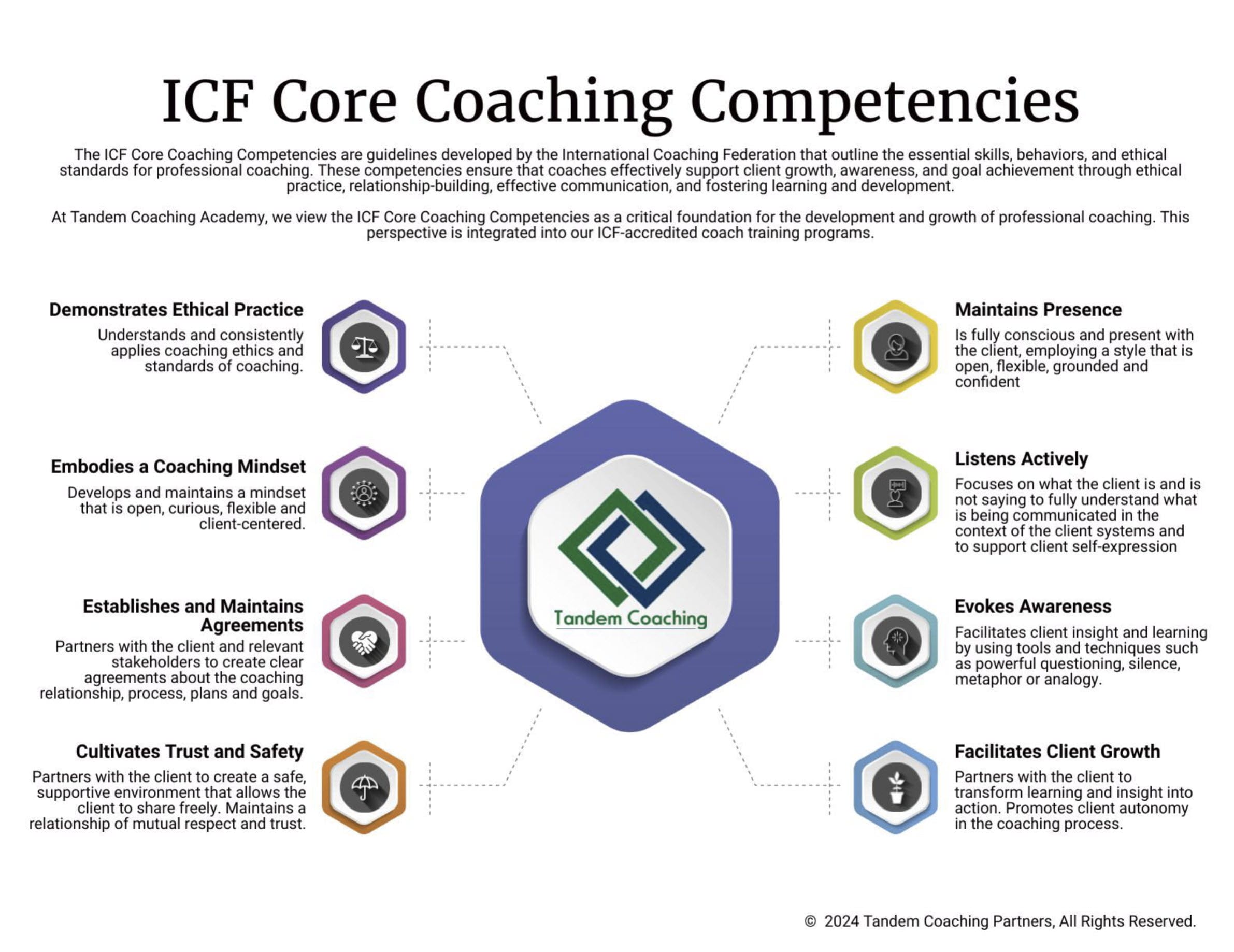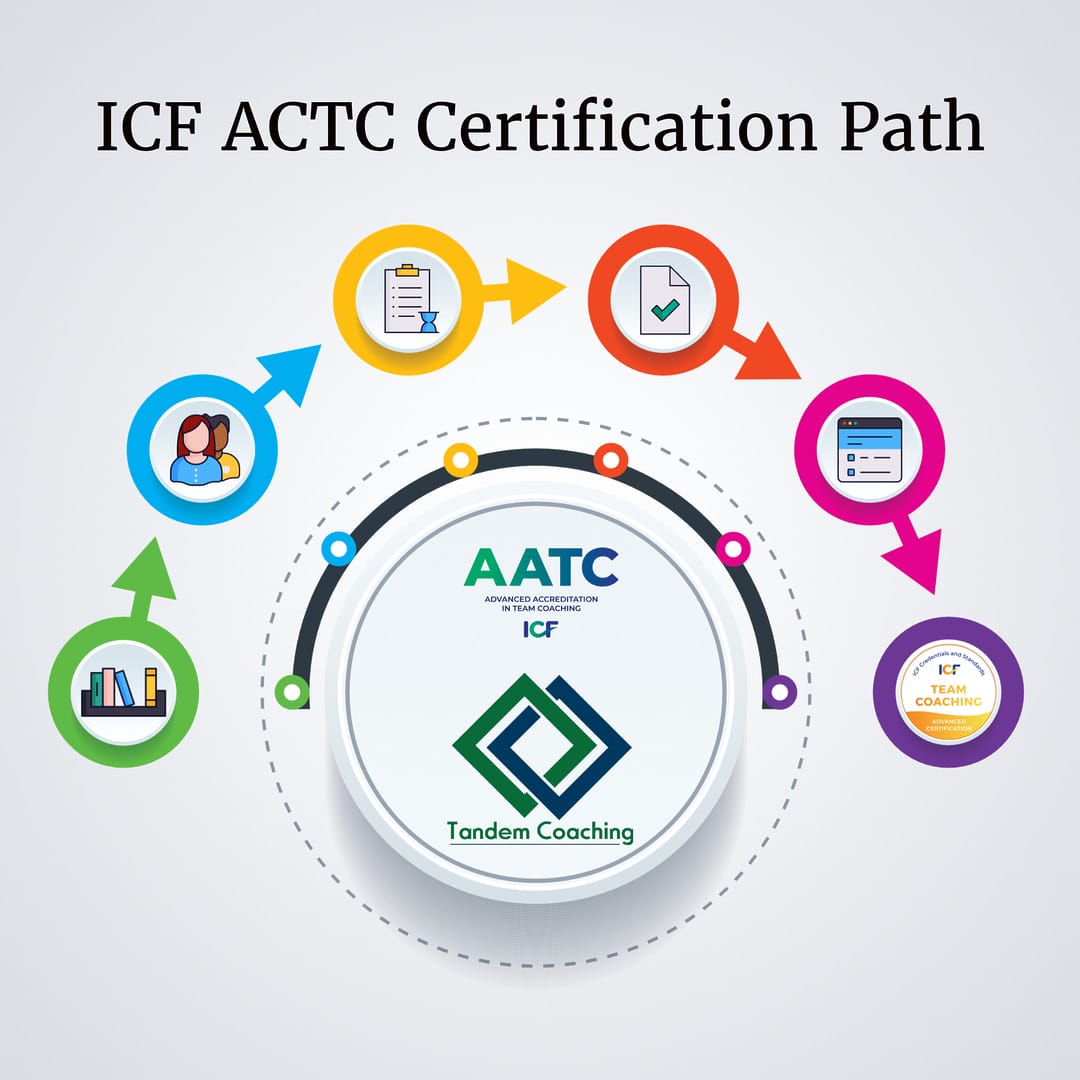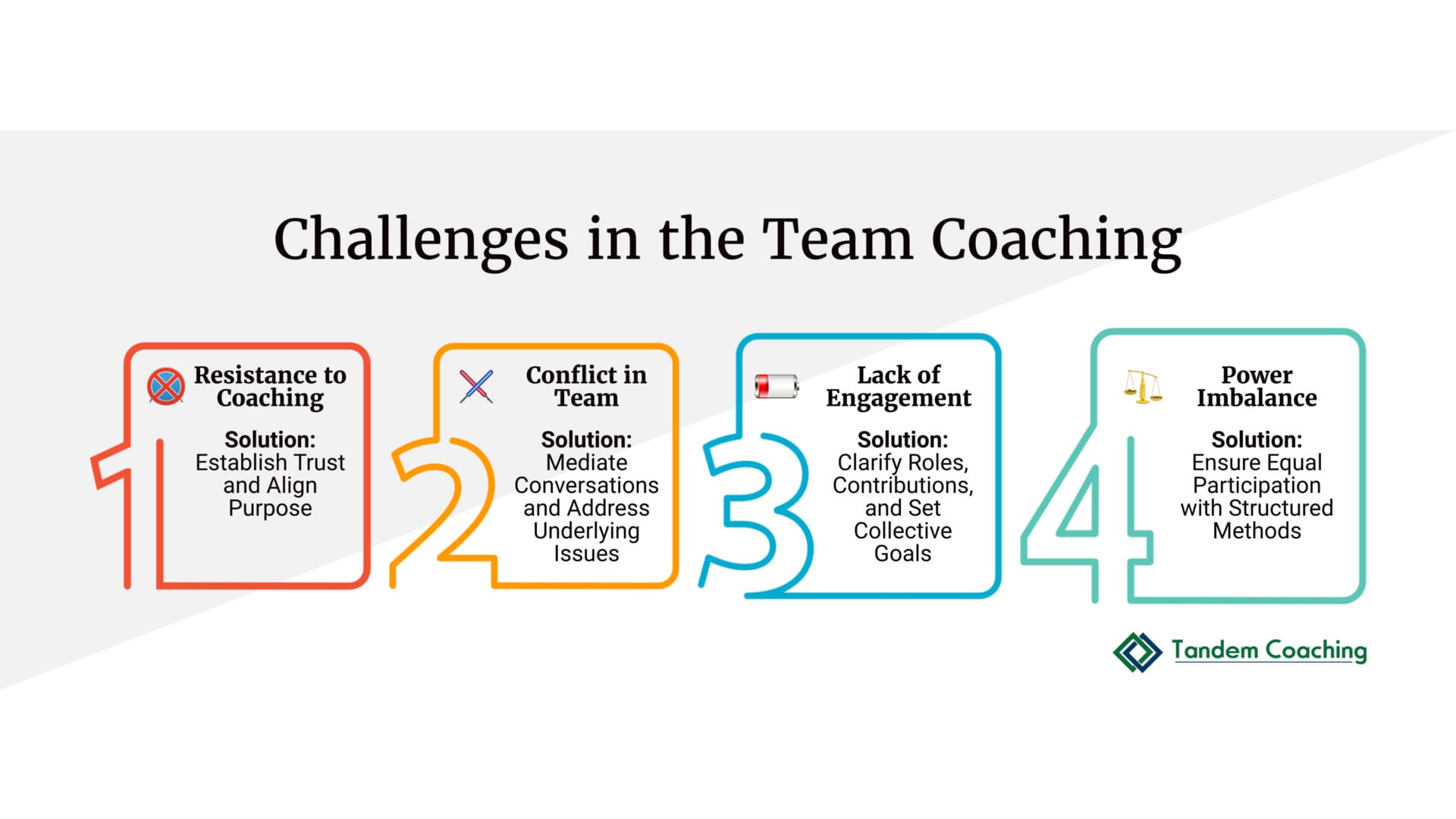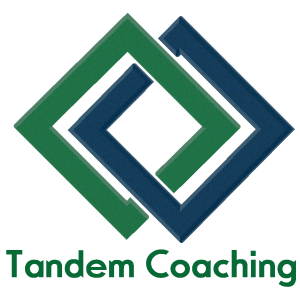
Unlock Your Coaching Potential with Tandem!
Dive into the essence of effective coaching with our exclusive brochure, meticulously crafted to help you master the ICF Core Coaching Competencies.
Table of Contents
Team coaching is one of the fastest-growing disciplines in the coaching profession, and the International Coaching Federation (ICF) has established a comprehensive set of competencies to guide coaches in this area. Whether you’re an experienced ICF coach or someone new to the field, mastering these competencies is essential for transitioning from one-on-one coaching to working effectively with teams.
This article will introduce you to the ICF Team Coaching Competencies, which build on the core ICF competencies but are designed specifically for team dynamics. You’ll learn how these competencies can enhance your coaching practice, from fostering trust and safety within teams to maintaining a flexible, team-centered mindset. We’ll also explore the ethical considerations unique to team coaching and provide strategies for successfully facilitating team growth and development.
By the end of this guide, you’ll have a deep understanding of how to apply the ICF Team Coaching Competencies to elevate your coaching practice, meet the growing demand for team coaching, and help teams achieve lasting success.
TL;DR: This article explores the ICF Team Coaching Competencies and their application in coaching teams toward higher performance and collaboration. It covers the importance of mastering key competencies like cultivating trust and safety, listening actively, and facilitating growth to navigate challenges such as resistance, conflict, and power imbalances. Additionally, it discusses the path to achieving the ICF Advanced Certification in Team Coaching (ACTC) and emphasizes the importance of continuing professional development for coaches to stay current with emerging trends such as remote team coaching, emotional intelligence, and AI-driven coaching tools.
Introduction to ICF Team Coaching Competencies
Team coaching has quickly become a crucial element in organizational growth and development, especially in today’s fast-paced work environment. Professional coaches looking to expand their skill set need to understand how to apply the ICF Team Coaching Competencies to guide teams toward higher performance, adaptability, and alignment with shared goals. But what makes team coaching different from individual coaching? How can these competencies be applied in real-world scenarios? This section will introduce the ICF Team Coaching Competencies and their relevance in this growing coaching discipline.
Why Team Coaching?
The demand for team coaching is rising in every sector, from corporate environments to non-profit organizations and government agencies. While individual coaching focuses on the growth and development of one person, team coaching extends these principles to a group of people working together toward common objectives. Coaches who work with teams need to master new skills related to managing team dynamics, ensuring collaboration, and helping the team achieve more than the sum of its parts.
Research shows that teams outperform individuals when their members work together effectively. According to the Harvard Business Review, well-functioning teams are 50% more productive than individuals working independently. This potential for greater performance is why more organizations are turning to team coaching as a means to improve collaboration, foster innovation, and boost overall performance.
But team coaching comes with its own challenges. Coaches need to balance individual needs with team dynamics, handle conflicts, and ensure that all team members feel included and valued. The ICF Team Coaching Competencies provide a clear framework for handling these complexities.
“The best teams learn how to leverage their collective intelligence, and that is where a skilled team coach can make all the difference.”
Differences Between Team Coaching and Individual Coaching
Many coaches, especially those with a background in individual coaching, may assume that team coaching simply involves coaching multiple people at once. However, the reality is far more nuanced. Team coaching requires a different approach because you are not just coaching individuals within the team; you are coaching the team as an entity. This means focusing on team dynamics, relationships, and the unique challenges that come with collaboration.
One critical distinction is the importance of group dynamics. In team coaching, it’s essential to understand how individuals interact with each other and how these interactions affect the team’s performance. Teams often face issues like power imbalances, conflicting personalities, and unclear communication patterns. As a team coach, you must facilitate conversations that address these dynamics while keeping the team aligned with its goals.
For example, consider a corporate team working on a large-scale project. The team coach may notice that while some members excel at taking the lead, others tend to stay silent during meetings. The coach’s role would be to create an environment where everyone feels empowered to contribute, fostering a culture of trust and collaboration. This is where the ICF competencies around trust-building and cultivating safety become crucial.
Benefits of Team Coaching for Organizations
Organizations benefit greatly from team coaching in several ways. One key benefit is improved collaboration, which often leads to more innovative solutions. When teams function at their best, they are better equipped to solve complex problems, adapt to change, and achieve their goals. A Gallup study found that teams that communicate effectively are 21% more productive and generate 22% higher profitability.
In addition to boosting productivity, team coaching can also improve employee satisfaction and retention. Teams that feel supported and aligned with their goals are more likely to stay motivated and engaged. This can be particularly important in industries where retaining top talent is a challenge.
For coaches, moving into team coaching offers the opportunity to expand their practice and tap into new markets. Organizations are increasingly seeking skilled team coaches who can help their teams achieve lasting results, making it a high-demand skill set.
Team coaching isn’t about fixing individual performance issues; it’s about maximizing the potential of the collective. When done well, it can lead to a high-performing, cohesive team capable of sustained success.

The Core Principles of ICF Team Coaching Competencies
The ICF Team Coaching Competencies serve as a framework for coaches to guide teams through challenges and growth opportunities. These principles are not standalone; they are designed to work in tandem with the ICF core coaching competencies that many professional coaches are already familiar with. However, these competencies are adapted for team contexts, focusing on group dynamics, collaboration, and collective performance.How Team Coaching Aligns with ICF Core Competencies
At the heart of the ICF Team Coaching Competencies is the foundation of the eight ICF core competencies. These core competencies—demonstrating ethical practice, embodying a coaching mindset, establishing agreements, cultivating trust and safety, maintaining presence, listening actively, evoking awareness, and facilitating client growth—are essential for individual coaching, but they take on added complexity in team coaching. In a team setting, these competencies must be applied not just to individual members but to the team as a whole.For example, cultivating trust and safety is a critical competency in any coaching relationship. In individual coaching, this involves building rapport and creating a safe space for the client to share their thoughts and feelings openly. However, in team coaching, the concept of safety must extend to the entire team. The coach needs to foster an environment where all team members feel secure in sharing their perspectives, even when they disagree with each other. This ensures that the team can function effectively and engage in honest, productive discussions.In addition, facilitating client growth takes on a new dimension in team coaching. While individual coaching focuses on personal growth, team coaching aims to help the team as a collective entity grow and develop. The coach must work to align individual members’ strengths with the team’s overarching goals, ensuring that the team can leverage its collective potential to achieve high performance.“The challenge in team coaching is aligning the goals of the individual with the goals of the group. The magic happens when the team sees themselves as one entity, working towards a shared vision.”
Adapting Core Competencies to Team-Focused Approaches
Coaches transitioning into team coaching must adapt their skills to address the dynamics and complexities of working with a group of individuals, rather than just one client at a time. One way that the ICF Team Coaching Competencies extend the core competencies is by emphasizing the importance of group dynamics and relationships. In a team setting, it’s not enough to coach individuals on their own performance; the coach must also pay attention to how team members interact with each other and how their interactions affect the overall team dynamic.For example, in a cross-functional team working on a major project, a coach might observe that some members dominate discussions while others remain quiet. The coach’s role is to facilitate a dialogue that brings all voices into the conversation, helping the team build a culture of open communication and collaboration. This often involves creating psychological safety, where team members feel comfortable sharing their thoughts without fear of judgment or retribution.Another example is in facilitating decision-making. Individual coaching often involves helping clients make decisions based on their personal goals and values. In team coaching, decision-making is more complex, as it involves aligning the goals and values of multiple people. The coach’s role is to guide the team through a decision-making process that takes into account all perspectives while keeping the team focused on its collective goals.Team Dynamics and the Importance of Relationships
Understanding team dynamics is critical for any team coach. Every team is made up of individuals with their own personalities, communication styles, and ways of working. Successful team coaching involves recognizing these differences and helping the team navigate them effectively. This requires the coach to be attuned not only to the needs of individual team members but also to the needs of the team as a whole.A key component of this is building strong relationships within the team. Teams that have strong, trusting relationships are more likely to collaborate effectively and achieve their goals. As a team coach, you must work to facilitate these relationships by encouraging open communication, addressing conflicts as they arise, and helping the team develop strategies for working together.For instance, in a marketing team facing tight deadlines, tensions may arise between the creative and analytical members. A team coach might use tools like stakeholder analysis or role clarification to ensure each member understands their unique contribution to the team’s success, helping to ease tension and improve collaboration.By mastering the ICF Team Coaching Competencies, professional coaches can help teams function at their highest level. These competencies offer a roadmap for addressing the unique challenges of team coaching, from managing group dynamics to fostering collaboration and alignment. In this way, team coaching becomes a powerful tool for organizations seeking to unlock the full potential of their teams.ICF Team Coaching Competency Framework
The ICF Team Coaching Competency Framework is an essential guideline for any coach transitioning from individual to team coaching. This framework builds on the eight core competencies of individual coaching and adapts them to team settings, providing coaches with the tools they need to work effectively with groups. Team coaching introduces a different set of dynamics, challenges, and opportunities that require specialized knowledge and skills. In this section, we’ll explore how this framework is structured and why it’s critical for successful team coaching.
Overview of the Eight ICF Team Coaching Competencies
The ICF Team Coaching Competencies build on the core competencies, but they are adapted to suit team environments. Let’s break down the key areas where these competencies shine in a team context:
- Demonstrate Ethical Practice: Team coaches must uphold the same ethical standards as individual coaches, but they must also be mindful of additional complexities like group confidentiality, power imbalances, and ethical dilemmas that arise when multiple stakeholders are involved. For a detailed guide on how to navigate these nuances, explore more about Ethical Practice in team coaching here.
- Embody a Coaching Mindset: Just as in individual coaching, team coaches must maintain a flexible, open, and non-judgmental attitude. However, team coaching requires an even greater focus on neutrality to manage diverse opinions and foster inclusive conversations. Learn more about the coaching mindset here.
- Establish and Maintain Agreements: Team coaching agreements must clarify the roles, expectations, and goals not just for the coach-client relationship, but for the entire team. This competency ensures that all parties are aligned from the start, which is particularly important in complex team environments with multiple stakeholders. Dive deeper into establishing effective team agreements.
- Cultivate Trust and Safety: A critical element in both individual and team coaching, but in team coaching, the focus is on creating a safe space where team members can speak freely and share concerns without fear of judgment. This competency emphasizes psychological safety, where all members feel valued. Read more about cultivating trust and safety here.
- Maintain Presence: In team coaching, maintaining presence means being fully aware of both individual and team dynamics. The coach must be able to respond flexibly to the needs of the team while remaining focused on the collective goals. Discover how mastering presence enhances team coaching.
- Listen Actively: Listening in team coaching requires not just hearing what is said, but also understanding the interactions between team members. Active listening in this context is about picking up on the dynamics that are not explicitly stated but are key to the team’s success. Find out more about active listening for team coaching success.
- Evoke Awareness: Team coaches use powerful questioning techniques to help teams gain insight into their dynamics, performance, and interactions. The goal is to increase self-awareness within the team, helping members see how their actions affect the group as a whole. Discover tools and strategies for evoking awareness in team coaching.
- Facilitate Client Growth: In team coaching, the coach’s role is to help the team identify and leverage its collective strengths, build on these, and achieve sustainable growth. This competency involves guiding the team toward continuous improvement and ensuring that growth is long-lasting. We will discuss facilitating client’s growth competency later in the article.
Integrating Core Competencies with Team-Focused Approaches
What sets the ICF Team Coaching Competency Framework apart is its emphasis on adapting traditional coaching methods to team contexts. Each of the core competencies mentioned above has a unique flavor when applied to teams. For example, while establishing agreements in individual coaching might involve a simple one-on-one contract, in team coaching, agreements must be more complex. The coach may need to create agreements not only with the team as a whole but also with individual team members and any stakeholders involved.
A practical example of this can be seen in a cross-departmental team tasked with launching a new product. The coach must ensure that all team members, including the marketing, sales, and R&D departments, are aligned on their roles and responsibilities. In this scenario, the agreement is multi-layered, ensuring that each department understands its unique contribution to the overall success of the team. This highlights how team coaching requires a more nuanced application of competencies.
How Team Coaches Apply the Framework in Real-World Scenarios
One of the biggest advantages of the ICF Team Coaching Competency Framework is its flexibility, allowing it to be adapted across various industries and settings. For example, in a non-profit organization, a team coach might work with a fundraising team that has been struggling to meet its targets. The coach’s role would be to apply competencies like listening actively and facilitating client growth to help the team identify internal communication barriers and find new ways to collaborate. The coach might guide the team through exercises that promote better listening and understanding of each other’s strengths, fostering a more cohesive working environment.
In a tech startup, where teams often face tight deadlines and high pressure, a coach using the ICF framework might focus on building psychological safety within the team. Startups are known for their fast-paced environments, which can sometimes lead to burnout or conflict among team members. A coach skilled in the cultivating trust and safety competency can help the team navigate these challenges, ensuring that all members feel heard and valued.
“Successful team coaching is about helping teams find their own solutions, rather than dictating them. It’s about facilitating a process where teams learn to communicate better, collaborate more effectively, and ultimately reach their shared goals.”
Unlike individual coaching, where personal growth is the primary focus, team coaching emphasizes collective achievement. Coaches in team settings need to balance individual contributions with group dynamics, which requires a deeper understanding of systems thinking. Systems thinking is the ability to view the team as a living organism, with each part interacting and affecting the whole. This perspective allows team coaches to identify patterns, address systemic issues, and facilitate solutions that benefit the team as a collective entity, rather than merely solving individual problems.
By leveraging this framework, coaches can transition successfully into team coaching, expanding their skillset and meeting the rising demand for effective team coaching across a wide range of industries. The ICF Team Coaching Competencies provide a clear path for coaches to follow, ensuring that they are equipped to handle the unique challenges of working with teams.
Facilitating Client Growth in Team Coaching
Facilitating client growth is a core competency in both individual and team coaching, but in team coaching, the focus shifts from personal development to collective growth. The goal is to help the team recognize its strengths, identify areas for improvement, and move toward achieving shared objectives. According to the ICF Team Coaching Competencies, facilitating client growth involves supporting the team in setting goals, developing action plans, and ensuring sustainable progress. In this section, we will explore how team coaches can effectively foster growth within a team, ensuring that the group not only meets its immediate goals but also evolves into a high-performing unit.
Guiding Teams Toward Goal Setting and Alignment
One of the first steps in facilitating client growth within a team is to ensure that the group is aligned on its goals. Misalignment is a common issue in teams, where individual members may have different interpretations of what success looks like. As a team coach, your role is to guide the team through a process of collective goal setting, ensuring that everyone has a clear understanding of the objectives and how they contribute to them.
For example, in a cross-functional development team working on a product launch, the marketing, development, and sales departments may have different expectations for the project’s success. A coach would facilitate a conversation where each department shares its goals, and the team collaboratively defines a set of objectives that satisfy everyone’s needs. This process ensures alignment and creates a sense of ownership over the team’s collective success.
One effective approach for goal-setting in team coaching is the SMART framework—ensuring that goals are Specific, Measurable, Achievable, Relevant, and Time-bound. By applying this framework to the team’s goals, the coach helps the group set clear, actionable objectives that can guide their progress. This also makes it easier for the team to track its progress over time, providing opportunities for celebration and recalibration as necessary.
“Facilitating growth in teams is about helping them clarify their goals, build collective ownership, and commit to a shared vision that drives both individual and team performance.”
Leveraging Collective Strengths for Team Growth
Another key aspect of facilitating growth is helping the team identify and leverage its collective strengths. Every team consists of individuals with different talents, skills, and perspectives. A successful team coach helps the group recognize these strengths and find ways to use them to achieve its goals. This might involve identifying areas where certain team members can take the lead or encouraging collaboration between team members who have complementary skills.
For example, in a non-profit fundraising team, some members may excel in relationship-building, while others are more analytical and skilled at managing data. A team coach can help the team recognize these strengths and assign roles that allow each member to contribute in a way that maximizes the team’s overall effectiveness. By focusing on strengths, rather than weaknesses, the coach encourages a growth mindset that empowers the team to operate at its best.
The Gallup StrengthsFinder is one tool that coaches can use to help teams identify and capitalize on their collective strengths. This tool allows each team member to identify their top strengths, and the coach can then facilitate discussions on how these strengths can be applied to the team’s goals. When teams understand and appreciate their individual and collective capabilities, they are more likely to work together cohesively and achieve greater results.
Addressing and Overcoming Obstacles to Growth
While focusing on strengths is important, team growth also involves recognizing and addressing obstacles that may be holding the group back. This could include conflicts between team members, communication breakdowns, or inefficiencies in processes. As a coach, your role is to help the team identify these obstacles and develop strategies to overcome them.
In a technology team facing challenges with project timelines, the coach might notice that communication is inconsistent between the development and design teams, leading to delays. The coach could facilitate a discussion where each team shares its pain points and collaboratively identifies solutions—such as establishing regular check-ins or using project management tools to streamline communication.
It’s important for the coach to foster a solution-oriented mindset within the team. Rather than focusing on blame, the team is encouraged to view challenges as opportunities for growth and improvement. This shift in mindset not only helps the team overcome immediate obstacles but also builds resilience, enabling the group to tackle future challenges with greater confidence.
Ensuring Sustainable Growth
Facilitating team growth is not just about achieving short-term wins; it’s about ensuring that the team’s development is sustainable over time. As a coach, it’s important to help the team implement systems and processes that will support ongoing improvement, even after the coaching engagement ends.
One way to ensure sustainability is by creating accountability structures within the team. For example, in a sales team working to improve its lead generation process, the coach might help the team set up regular check-ins where members review their progress and hold each other accountable for meeting their targets. This type of accountability ensures that the team continues to grow and adapt, even in the absence of the coach.
The coach can also facilitate the development of self-reflection practices within the team. By encouraging the group to regularly reflect on its progress, celebrate successes, and identify areas for improvement, the coach empowers the team to take ownership of its growth. This ongoing reflection helps the team stay focused on its goals and ensures that growth is sustained over time.
“Sustainable growth happens when teams are empowered to reflect on their progress, hold themselves accountable, and continuously seek new ways to improve.”
Case Study: Facilitating Growth in a Healthcare Team
Consider a healthcare team working to improve patient outcomes. The coach observes that while the doctors, nurses, and administrative staff all have strong skills, there is a disconnect in communication between departments, leading to inefficiencies in patient care. The coach facilitates a series of workshops where each department shares its challenges and strengths, helping the team develop a clearer understanding of how they can support one another.
The coach also helps the team implement a new system for tracking patient data that improves communication and reduces errors. Over time, the team begins to see improvements in both patient outcomes and internal collaboration. By focusing on both individual strengths and collective goals, the coach facilitates sustainable growth within the team.
Facilitating growth in team coaching is about guiding the team through the process of setting clear goals, leveraging its strengths, and addressing obstacles in a way that ensures long-term success. By helping teams develop accountability structures and fostering a solution-oriented mindset, coaches can ensure that the team continues to grow and evolve even after the coaching engagement has ended. This approach not only helps the team achieve its immediate goals but also equips them with the tools they need for ongoing development.
Practical Applications of ICF Team Coaching Competencies
The ICF Team Coaching Competencies provide a solid framework for coaches working with teams, but their true value lies in how they are applied in real-world settings. Understanding these competencies is only the first step—coaches must be able to adapt and apply them across different contexts and challenges. In this chapter, we will explore practical applications of the ICF competencies in various industries and scenarios, illustrating how they can be used to foster high-performing teams, resolve conflicts, and promote lasting growth.
Applying Competencies in Different Team Contexts
Corporate Teams: Corporate environments often consist of cross-functional teams working on complex projects with tight deadlines. In these settings, the competencies of cultivating trust and safety and maintaining presence are crucial. For example, a coach working with a corporate product development team might observe that certain departments (like marketing and R&D) struggle to communicate effectively. By applying the competency of active listening and creating a safe space for open dialogue, the coach can help the team address miscommunication and align their efforts toward the project goals. This competency also aids in resolving misunderstandings or hesitancies that emerge when team members are afraid to express concerns or disagreements openly (Coaching Online) (Team Transformation).
Non-Profit Teams: In non-profit organizations, where resources are often limited, fostering a collaborative and supportive team culture is critical. A coach working with a fundraising team can leverage the competency of evoking awareness to help team members see how their individual strengths contribute to collective goals. This is particularly useful when teams are working under pressure to meet fundraising targets. The coach might use techniques such as scenario analysis or strengths mapping to help the team identify innovative strategies for engaging donors and collaborating more effectively (TeamCoaching Global).
Healthcare Teams: Healthcare teams, often working in high-pressure environments, face unique challenges such as managing patient care, internal communication, and resource allocation. A coach can apply the competency of facilitating client growth by guiding the team through discussions about improving patient care workflows. This might involve encouraging the team to reflect on how they can streamline processes and support each other more effectively. In addition, using the maintaining presence competency helps the coach stay calm and centered while facilitating conversations about sensitive topics, such as patient outcomes or resource shortages (Coaching Online) (Team Transformation).
Resolving Team Conflicts Using Coaching Competencies
Conflict is inevitable in teams, but how it is managed can determine the team’s success. One of the most valuable applications of ICF competencies is in conflict resolution. For instance, when a technology startup team experiences disagreements over project priorities, the coach can apply the competency of cultivating trust and safety to create a space where the team can openly discuss their concerns. The coach might guide the team through structured dialogues or mediated discussions to help them identify the root causes of the conflict and develop collaborative solutions. By ensuring that every team member feels heard and respected, the coach can defuse tensions and steer the team toward productive, solution-oriented conversations (International Coaching Federation) (Team Transformation).
Additionally, the competency of listening actively plays a crucial role in resolving conflicts. In a sales team, for example, if certain members feel that their contributions are being overlooked, the coach can observe non-verbal cues and group dynamics to identify areas of tension. By using reflective questioning, the coach can facilitate a conversation that brings these issues to light, allowing the team to address them constructively (Coaching Online).
Enhancing Team Performance Through Accountability
The ICF competencies are particularly effective in helping teams build systems of accountability. In a cross-departmental project team, for instance, the coach can facilitate the development of accountability structures that ensure all members are responsible for their contributions. The competency of establishing and maintaining agreements is vital here. The coach might help the team establish clear roles, responsibilities, and timelines for each project task. Regular check-ins and feedback loops, facilitated by the coach, help the team stay on track and adjust their approach as needed (Coaching Online).
By guiding the team through the process of setting up SMART goals (Specific, Measurable, Achievable, Relevant, Time-bound), the coach ensures that the team has a clear roadmap for success. This structured approach not only improves team performance but also empowers team members to take ownership of their work, leading to greater engagement and satisfaction.
Supporting Teams During Times of Change
One of the most valuable applications of ICF Team Coaching Competencies is during times of organizational change. Whether it’s a merger, restructuring, or leadership transition, teams often struggle with uncertainty and resistance. A coach can use the competency of embodying a coaching mindset to remain flexible and adaptive during these periods, guiding the team through uncertainty with a calm and reassuring presence.
For example, during a corporate merger, the coach might help the team manage the stress of adjusting to new roles and workflows. By applying the competency of evoking awareness, the coach can facilitate discussions that help the team reflect on how they can embrace change and align their efforts with the organization’s new direction. This might involve using future pacing techniques, where the team envisions their desired future state and works backward to identify actionable steps to achieve it (International Coaching Federation) (Team Transformation).
“Coaching competencies are most powerful when applied during times of transition. Coaches can help teams navigate change by fostering open dialogue, encouraging flexibility, and maintaining a focus on shared goals.”
Case Study: Applying Competencies in a Cross-Functional Team
Consider a cross-functional technology team tasked with developing a new product under tight deadlines. The team is experiencing conflict between the engineering and marketing departments, with each side feeling that the other is not respecting their timelines or priorities. The coach observes this tension and applies the competency of establishing and maintaining agreements to guide the team through a collaborative goal-setting process. By facilitating a discussion where both departments can share their concerns and expectations, the coach helps the team create an action plan that balances the needs of both groups.
Using the competency of listening actively, the coach also picks up on underlying frustrations that haven’t been openly expressed. By addressing these concerns and fostering an environment where all voices are heard, the coach helps the team resolve their conflicts and refocus on their shared goal—delivering the product on time and to a high standard (TeamCoaching Global).
The ICF Team Coaching Competencies provide a versatile and effective framework for addressing a wide range of challenges in team coaching. Whether working in corporate, non-profit, or healthcare environments, coaches can apply these competencies to foster trust, resolve conflicts, enhance performance, and guide teams through periods of change. By focusing on practical applications and adapting the competencies to fit the unique needs of each team, coaches can help groups unlock their full potential and achieve lasting success.
ICF Advanced Certification in Team Coaching (ACTC)
The ICF Advanced Certification in Team Coaching (ACTC) is a prestigious credential that highlights a coach’s ability to navigate complex team dynamics and deliver impactful coaching engagements at an advanced level. This certification sets team coaches apart by validating their expertise in applying the ICF Team Coaching Competencies, which include fostering collaboration, managing team dynamics, and cultivating trust and safety in a group environment.
Path to ACTC Certification
To achieve the ACTC, applicants need to demonstrate significant coaching experience, education, and reflective practice. The requirements include:
- 60 hours of team coaching education.
- 5 team coaching engagements completed within the last five years, focusing on real team coaching sessions.
- 5 hours of coaching supervision, designed to help coaches reflect on and improve their team coaching practice.
- A final Team Coaching Certification Exam, which tests the coach’s ability to apply the ICF Team Coaching Competencies in practical settings.
Coaches must also undergo an assessment process that includes submitting coaching recordings for review and passing a comprehensive exam developed by experienced team coaching practitioners. This ensures that ACTC-certified coaches possess the skills and knowledge to handle the complexities of team coaching.

Benefits of ACTC Certification
Coaches who earn the ACTC credential distinguish themselves in the marketplace. This certification demonstrates their advanced capabilities, enabling them to effectively work with teams in various organizational settings, from corporate environments to nonprofit groups. It signals to clients that the coach is well-versed in managing group dynamics, facilitating growth, and applying systemic coaching approaches to foster team cohesion and performance.
The Tandem Coaching Academy offers a well-structured program for those pursuing the ACTC, integrating both the practical and theoretical aspects of team coaching. Tandem Coaching’s ACTC-aligned program includes live sessions, recorded team coaching demonstrations, and mentor coaching with a team coaching focus. This comprehensive approach ensures that participants are fully prepared for certification. Additionally, the program includes supervision sessions that provide valuable insights into complex team coaching scenarios, allowing coaches to refine their techniques in real-time.
Tandem Coaching’s ACTC pathway provides all the necessary tools and resources to meet the certification requirements and helps coaches develop their skills through practical coaching engagements, reflective supervision, and personalized feedback sessions.
For more details on Tandem Coaching’s ACTC program, you can visit Tandem Coaching’s ACTC page (Tandem Coaching).
How the ACTC Elevates Team Coaching
Earning the ACTC not only enhances a coach’s credibility but also empowers them to lead high-stakes team coaching engagements. In particular, coaches are better equipped to handle:
- Organizational change: ACTC coaches can guide teams through transitions such as mergers, restructures, or leadership changes.
- Conflict resolution: The ICF competencies help coaches foster trust and resolve conflicts within teams, promoting collaboration.
- Team development: With advanced training, ACTC coaches help teams identify and leverage their collective strengths, ensuring long-term success.
Coaches certified with ACTC have the unique ability to understand and respond to team challenges, ultimately driving better results for their clients in diverse settings. The certification ensures that these professionals are recognized for their proficiency in handling team dynamics and leading teams toward achieving their goals effectively.
Challenges in Team Coaching and How to Overcome Them
Team coaching comes with its own unique set of challenges that coaches must be prepared to navigate. While individual coaching focuses on one person’s growth and development, team coaching requires managing the complexities of group dynamics, power imbalances, and conflicting personalities. For a team coach, understanding these challenges and employing effective strategies to address them is critical for success. This chapter will explore some of the most common challenges in team coaching and offer strategies for overcoming them.
Common Challenges in Team Coaching
Resistance to Coaching Resistance is a frequent challenge in team coaching, especially when team members are skeptical of the process or see it as unnecessary. In some cases, team members may view coaching as a critique of their performance, leading them to resist engaging fully. Resistance can manifest in many forms, such as reluctance to participate in discussions, lack of openness to feedback, or passive disengagement.
How to Overcome It: Overcoming resistance requires the coach to establish trust early in the process. By fostering an environment where team members feel safe and respected, the coach can encourage greater openness and participation. The competency of cultivating trust and safety, as outlined in the ICF Team Coaching Competencies, is key here. Coaches can also address resistance by clarifying the purpose and benefits of the coaching process, aligning it with the team’s goals to show how it supports their success.
For instance, in a non-profit team where fundraising efforts have been lagging, some members may resist new strategies suggested by the coach. To overcome this, the coach can facilitate a conversation that highlights the team’s collective purpose—achieving the organization’s mission—and how the coaching process can help them work together more effectively to meet those goals.
Conflict Between Team Members Conflict is another common challenge in team coaching, particularly in teams with diverse personalities or competing interests. While some level of conflict can be healthy and drive innovation, unresolved conflict can derail the team’s progress and create a toxic environment.
How to Overcome It: The ICF competencies provide a framework for managing team conflict effectively, particularly through active listening and facilitating client growth. Coaches can help the team address conflict by encouraging open communication and ensuring that all voices are heard. Techniques like conflict resolution frameworks and structured dialogues can help team members express their concerns in a constructive manner.
In a cross-functional corporate team, where departments such as marketing and product development may have conflicting priorities, the coach can use these competencies to guide the team through discussions that balance each group’s concerns. By mediating the conversation and reframing conflict as an opportunity for collaboration, the coach helps the team turn their differences into a source of creative problem-solving.
Lack of Engagement Disengagement can occur when team members feel disconnected from the team’s objectives or undervalued within the group. This challenge often surfaces in teams where a few dominant personalities overshadow quieter members or where team members struggle to see the relevance of their contributions.
How to Overcome It: To counter disengagement, coaches need to focus on evoking awareness and ensuring that all team members feel seen and heard. The coach can facilitate discussions that highlight each individual’s unique contributions to the team’s success. Using techniques like strengths assessments or role clarification, the coach can help each team member understand their value and align their efforts with the team’s broader goals.
For example, in a healthcare team, administrative staff may feel less engaged in decision-making processes compared to medical personnel. By actively involving them in discussions and demonstrating how their work directly impacts patient care, the coach can re-engage these team members and foster a more collaborative, inclusive environment.
Power Imbalances Power imbalances can disrupt team dynamics, particularly in hierarchical organizations where some members hold more authority than others. These imbalances may lead to unequal participation, where the voices of senior team members overshadow those of less experienced or lower-ranking individuals.
How to Overcome It: Coaches can manage power imbalances by creating structures that ensure equitable participation. This might involve using techniques such as round-robin discussions, where each member has a designated time to speak, or anonymous feedback tools that allow quieter team members to share their thoughts without fear of repercussions. The competency of establishing and maintaining agreements is critical in this context, as it ensures that all team members are aligned on how they will interact during coaching sessions.
In a tech startup, where the CEO might naturally dominate conversations, the coach can set clear ground rules that promote equal contribution from all team members, allowing for a diversity of perspectives to emerge. This not only balances power dynamics but also enriches the team’s problem-solving capabilities.

Strategies for Overcoming Common Challenges
- Building Psychological Safety: One of the most effective ways to overcome challenges such as resistance, conflict, and disengagement is by creating a culture of psychological safety. When team members feel safe to express themselves without fear of judgment or retribution, they are more likely to engage fully in the coaching process. Coaches can cultivate this safety by applying trust-building techniques and setting clear expectations for respectful communication.
- Facilitating Honest Feedback: Honest and transparent feedback is essential for team growth, but many teams struggle with providing and receiving feedback in a constructive manner. Coaches can introduce feedback models, such as feedforward, where team members offer suggestions for future improvement rather than critiquing past performance. This shifts the focus from criticism to collaboration and creates a forward-thinking mindset within the team.
- Promoting Peer Accountability: Coaches can help teams stay engaged and aligned by fostering a sense of peer accountability. When team members hold each other accountable for meeting deadlines, contributing to discussions, and achieving goals, they are more likely to stay committed to the process. This can be reinforced by setting shared goals and performance metrics that everyone is responsible for tracking.
- Using Reflective Practice: Coaches can encourage the team to engage in reflective practice by regularly reviewing their progress and reflecting on how well they are working together. This practice helps teams recognize patterns that may be hindering their progress and develop strategies for improvement. Reflective practice also allows the coach to check in on how team members are feeling about the coaching process, ensuring that any issues are addressed promptly.
The challenges of team coaching are diverse, ranging from resistance and disengagement to conflict and power imbalances. However, by applying the ICF Team Coaching Competencies and employing targeted strategies, coaches can overcome these obstacles and guide teams toward higher performance, collaboration, and growth. By fostering psychological safety, promoting open communication, and creating structures for accountability, coaches can transform challenges into opportunities for development and strengthen the team’s overall effectiveness.
Continuing Professional Development for Team Coaches
As the field of coaching evolves, team coaches must stay current with new trends, tools, and methodologies to remain effective in their roles. Continuing Professional Development (CPD) is essential for coaches to refine their skills, expand their knowledge, and stay aligned with the latest developments in coaching practices. For team coaches, ongoing learning involves not just enhancing their technical competencies but also engaging in reflective practice, peer learning, and receiving regular feedback from supervisors and colleagues.
This chapter explores the key avenues for ongoing professional development, highlights the importance of feedback and supervision, and outlines opportunities for team coaches to deepen their expertise.
Opportunities for Ongoing Learning and Skill Development
ICF Credential Renewal and Continuing Education For those holding an ICF credential, such as the ACTC (Advanced Certification in Team Coaching) or other coaching certifications, maintaining this credential requires ongoing education. The ICF mandates that credentialed coaches complete Continuing Coach Education (CCE) units over a three-year renewal cycle. This includes courses in Core Competencies, ethics, and resource development, which focus on expanding coaches’ knowledge and practice areas.
Tandem Coaching Academy offers a variety of learning opportunities for coaches seeking to renew their credentials or enhance their team coaching skills. Their programs, aligned with the ICF competencies, ensure coaches are prepared to handle real-world team coaching challenges while staying compliant with ICF’s standards. Coaches can learn more about Tandem’s continuing education offerings here.
Workshops and Conferences Attending coaching workshops, seminars, and industry conferences is a powerful way for team coaches to stay up-to-date with new research, tools, and practices. These events offer coaches the chance to network with peers, learn from industry leaders, and explore new coaching models that can be applied to their team coaching practices.
For instance, events like the ICF Converge conference and other global coaching forums provide cutting-edge insights into the evolving role of team coaching. Coaches can learn about the latest techniques in group facilitation, conflict resolution, and performance coaching, all while earning CCE units toward their credential renewal (ICF Mentor Coach).
Advanced Training in Team Coaching Models Many coaching organizations offer specialized training programs that delve deeper into specific team coaching models or methodologies. Programs like ORSC (Organization and Relationship Systems Coaching) focus on relationship systems and group dynamics, helping team coaches refine their ability to manage complex interactions in diverse team environments. This type of advanced training helps coaches integrate new frameworks into their practice and better support the unique needs of their clients.
Online Learning Platforms The rise of online learning platforms like Coursera, Udemy, and LinkedIn Learning has made professional development more accessible than ever before. Coaches can enroll in specialized courses on topics such as leadership coaching, team dynamics, and organizational psychology, allowing them to expand their expertise in areas relevant to team coaching. These platforms also offer flexibility, allowing coaches to learn at their own pace while balancing their coaching practice.
Importance of Peer Learning, Feedback, and Coaching Supervision
Peer Learning and Collaboration Peer learning is an invaluable tool for professional growth. Engaging in discussions with fellow coaches allows for the exchange of ideas, experiences, and techniques. Participating in peer coaching groups or coaching circles enables coaches to receive feedback from their peers, share challenges, and collaboratively problem-solve.
Coaches can also join professional networks like the ICF or specialized team coaching groups to stay connected with a community of practitioners. These networks often offer webinars, forums, and discussion groups that foster learning through collective experiences.
Coaching Supervision Coaching supervision is a reflective practice that provides a structured environment for coaches to discuss their work, explore personal and professional challenges, and receive feedback from experienced supervisors. This is especially crucial in team coaching, where the complexities of group dynamics can be overwhelming.
Supervision sessions allow team coaches to reflect on their experiences, explore difficult situations, and gain new perspectives on their coaching practice. Coaches can also use supervision to identify blind spots, strengthen their emotional intelligence, and improve their ability to navigate team conflict or resistance. Programs like Tandem Coaching’s ICF-aligned supervision offerings provide an excellent avenue for ongoing reflection and professional growth.
“Supervision helps team coaches gain critical feedback, reflect on complex group dynamics, and continuously improve their practice. It’s a necessary part of every coach’s development journey.”
Receiving and Integrating Feedback Feedback from clients and peers is an essential part of professional growth for any coach. Coaches who actively seek feedback are better equipped to identify areas for improvement and refine their approach. In team coaching, feedback can come from the team members themselves, who can provide insights into how the coach’s interventions have impacted group dynamics, communication, and overall performance.
Coaches can also use feedback from supervisors and peers to enhance their ICF core competencies, such as maintaining presence or facilitating client growth. By integrating this feedback into their practice, coaches can continuously evolve and become more effective in supporting teams.
Ongoing professional development is vital for team coaches who want to maintain their effectiveness and stay at the forefront of the coaching profession. Through continued education, peer collaboration, coaching supervision, and feedback, coaches can deepen their expertise, refine their skills, and ensure that they are providing the highest level of support to the teams they work with. As the field of coaching evolves, staying committed to professional growth is what sets excellent coaches apart from the rest.
Coaches interested in enhancing their team coaching capabilities and keeping up with the latest trends can explore development opportunities through accredited programs like those offered by Tandem Coaching Academy. This commitment to learning not only benefits the coach but also leads to more impactful and successful coaching engagements with teams (Tandem Coaching).
Conclusion: The Future of Team Coaching
As the landscape of work continues to evolve, the demand for effective team coaching will only grow. The role of team coaches is becoming increasingly crucial as organizations recognize the value of high-performing teams in achieving their strategic goals. In this final chapter, we will explore emerging trends in team coaching, the evolving role of team coaches in a rapidly changing work environment, and how mastering the ICF Team Coaching Competencies prepares coaches for the future.
Emerging Trends in Team Coaching
Hybrid and Remote Teams The rise of hybrid and fully remote work environments has created new challenges and opportunities for team coaching. Coaches now need to be adept at working with teams that may be geographically dispersed, using virtual platforms to foster collaboration and trust. Team dynamics shift significantly in virtual settings, where non-verbal communication and face-to-face interactions are limited.
Virtual team coaching tools and platforms are increasingly being integrated into coaching practices. Coaches are now leveraging platforms such as Zoom and Microsoft Teams to facilitate group discussions, mediate conflicts, and maintain engagement across remote teams. The trend toward virtual collaboration is likely to continue, with team coaches needing to refine their skills in working with technology while ensuring that trust and psychological safety are upheld in the virtual space.
AI and Data-Driven Coaching Artificial intelligence (AI) and data-driven insights are starting to influence team coaching practices. From tools that assess team performance and dynamics in real-time to AI-driven personality assessments, coaches can now use technology to gather valuable data about teams. This data can help coaches identify trends, predict potential conflicts, and tailor their interventions more effectively.
While AI cannot replace the nuanced understanding and emotional intelligence of a coach, it serves as a valuable tool for enhancing a coach’s insights and supporting data-informed decision-making. Coaches who integrate AI tools into their practice are better positioned to meet the growing demand for measurable outcomes and performance improvements in organizations.
Focus on Emotional Intelligence and Well-Being In an increasingly complex and fast-paced work environment, emotional intelligence and well-being are becoming central to team coaching. Organizations are recognizing that high-performance teams are not just about productivity but also about the emotional health and resilience of team members. Coaches are now called to focus on well-being coaching, helping teams navigate stress, prevent burnout, and build emotional resilience.
Emotional intelligence is also crucial in managing team dynamics, particularly in diverse teams where cultural and personality differences can create friction. Coaches who specialize in fostering emotional intelligence within teams are able to guide them toward deeper collaboration, empathy, and collective success.
The Evolving Role of Team Coaches
Facilitators of Organizational Change The role of the team coach is shifting from simply being a facilitator of team discussions to becoming a change agent within organizations. Team coaches are increasingly involved in helping organizations navigate major transformations such as mergers, leadership transitions, and cultural shifts. This requires coaches to have a deep understanding of organizational change management, as well as the ability to support teams through periods of uncertainty and transition.
Coaches who master the ICF Team Coaching Competencies are well-prepared to step into this expanded role. By focusing on competencies such as evoking awareness and facilitating client growth, coaches can guide teams through change with greater resilience and adaptability.
Diversity and Inclusion Diversity, equity, and inclusion (DEI) are gaining prominence in team coaching. As workplaces become more diverse, team coaches must be skilled in navigating cultural differences and fostering inclusive environments where every team member feels valued. The ICF competencies of cultivating trust and safety and listening actively are particularly relevant here, as they help coaches create spaces where diverse perspectives can be shared openly.
Coaches who understand the importance of DEI are positioned to help teams leverage their diversity as a strength, promoting innovative thinking and better decision-making.
How Mastering ICF Team Coaching Competencies Prepares Coaches for the Future
The ICF Team Coaching Competencies provide a comprehensive framework for addressing the challenges and opportunities of modern team coaching. By mastering these competencies, coaches can:
- Adapt to Changing Work Environments: The shift toward hybrid and remote teams, as well as the integration of AI into coaching, requires coaches to be flexible and tech-savvy. The ICF competencies help coaches maintain presence and build trust, even in virtual spaces.
- Support Organizational Change: As organizations undergo rapid transformation, coaches who can guide teams through change are in high demand. The competencies around facilitating growth and evoking awareness are critical for helping teams adapt to new realities.
- Foster Emotional Intelligence and Well-Being: Coaches who can integrate emotional intelligence into their practice will play a pivotal role in supporting team well-being, reducing burnout, and enhancing team collaboration.
- Promote Diversity and Inclusion: With DEI becoming central to team dynamics, coaches who excel at listening actively and cultivating trust will be well-prepared to help teams harness the power of diversity.
“The future of team coaching is one where technology, emotional intelligence, and inclusivity come together to create high-performing, resilient teams. Coaches who master the ICF Team Coaching Competencies are uniquely equipped to lead teams into this future.”
The future of team coaching is bright, with emerging trends that will shape the role of coaches in profound ways. Coaches who stay ahead of these trends by continuously developing their skills and mastering the ICF Team Coaching Competencies will be well-positioned to support teams in achieving their goals in a fast-changing work environment. By embracing innovation, fostering emotional intelligence, and promoting inclusivity, team coaches will play a key role in driving the success of organizations for years to come.
This forward-thinking approach ensures that the coaching profession remains a critical component of organizational success, empowering teams to thrive in both current and future work landscapes.
Team Coaching at a Glance: Key Takeaways
- Mastering ICF Team Coaching Competencies: Coaches who excel in competencies like cultivating trust, active listening, and evoking awareness are well-equipped to guide teams through complex challenges, fostering collaboration and achieving collective goals.
- ICF Advanced Certification in Team Coaching (ACTC): Earning the ACTC credential requires rigorous training and experience, including 60 hours of team coaching education, 5 coaching engagements, and a certification exam—marking coaches as advanced practitioners in the field.
- Overcoming Common Challenges: Key strategies for addressing team conflicts, resistance, and disengagement include creating psychological safety, using structured dialogues to manage power imbalances, and fostering open communication through feedback loops.
- Continuing Professional Development: Team coaches can enhance their skills through peer learning, coaching supervision, and participation in ICF-approved continuing education programs, ensuring they stay current with the latest methodologies and trends.
- Future of Team Coaching: Emerging trends such as virtual team coaching, the integration of AI-driven tools, and a focus on emotional intelligence and well-being are shaping the future of team coaching, with coaches playing a key role in navigating these shifts.
- Diversity and Inclusion in Teams: As workplaces become more diverse, team coaches must foster inclusive environments by ensuring that every voice is heard, utilizing competencies like cultivating trust and listening actively to bridge cultural gaps and promote collaboration.
- Practical Tools and Approaches: Coaches who integrate practical frameworks, such as conflict resolution techniques and peer accountability structures, can significantly improve team dynamics and performance, leading to long-term success for their clients.
Your ICF Team Coaching FAQ: Expert Answers
What are the core ICF Team Coaching Competencies?
The ICF Team Coaching Competencies include eight key areas:
- cultivating trust and safety,
- establishing and maintaining agreements,
- listening actively,
- evoking awareness,
- facilitating client growth,
- demonstrating ethical practice,
- maintaining presence, and
- embodying a coaching mindset.
These competencies guide coaches in helping teams achieve collaborative success and navigate group dynamics effectively.
How does team coaching differ from individual coaching?
Team coaching focuses on enhancing group performance by fostering collaboration, resolving conflicts, and managing collective goals, while individual coaching emphasizes personal development. Team coaches must navigate dynamics like power imbalances and collective decision-making, which are less prevalent in one-on-one coaching.
What is the ICF Advanced Certification in Team Coaching (ACTC)?
The ICF ACTC is a specialized credential that requires coaches to complete 60 hours of team coaching education, 5 team coaching engagements, and a rigorous certification exam. This advanced certification demonstrates a coach’s expertise in applying the ICF competencies to real-world team settings.
What are the most common challenges in team coaching?
Some common challenges in team coaching include resistance to coaching, team conflict, disengagement, and power imbalances. Coaches use strategies like creating psychological safety, managing conflict through structured dialogues, and encouraging peer accountability to overcome these obstacles.
How can a coach manage conflict in a team setting?
Conflict is managed through active listening, ensuring all team members are heard, and using conflict resolution frameworks to mediate discussions. Coaches help the team turn disagreements into opportunities for growth by fostering open communication and addressing underlying issues.
What are the benefits of earning the ACTC certification?
Earning the ACTC certification positions coaches as advanced practitioners capable of handling complex team dynamics, driving collaboration, and leading teams through change. It’s a highly respected credential that distinguishes coaches in the marketplace, especially for organizations seeking qualified team coaches.
How do coaches support remote or hybrid teams?
In virtual environments, team coaches apply the same ICF competencies but adapt them to digital platforms like Zoom or Microsoft Teams. Coaches focus on maintaining engagement, ensuring trust in virtual spaces, and facilitating productive, tech-enabled collaboration.
Why is continuing professional development important for team coaches?
Continuing professional development ensures team coaches stay up-to-date with emerging trends, tools, and best practices. Through peer learning, coaching supervision, and ongoing education, coaches can refine their skills and stay effective in helping teams navigate new challenges.
How can team coaching improve organizational performance?
Team coaching improves organizational performance by fostering better communication, aligning team goals with broader business objectives, and enhancing collaboration across departments. It leads to more cohesive teams that can innovate and solve problems more effectively.
What role does emotional intelligence play in team coaching?
Emotional intelligence is crucial for managing team dynamics, fostering empathy, and addressing conflicts. Coaches help teams build emotional intelligence by guiding them to recognize and manage emotions, which improves collaboration and reduces stress.















